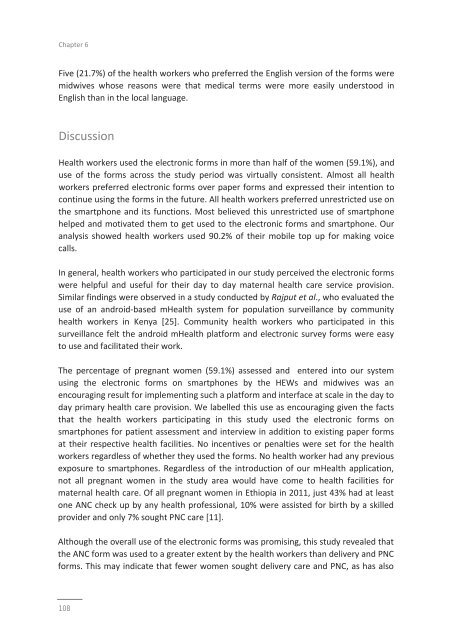araya-thesis
araya-thesis
araya-thesis
Create successful ePaper yourself
Turn your PDF publications into a flip-book with our unique Google optimized e-Paper software.
Chapter 6<br />
Five (21.7%) of the health workers who preferred the English version of the forms were<br />
midwives whose reasons were that medical terms were more easily understood in<br />
English than in the local language.<br />
Discussion<br />
Health workers used the electronic forms in more than half of the women (59.1%), and<br />
use of the forms across the study period was virtually consistent. Almost all health<br />
workers preferred electronic forms over paper forms and expressed their intention to<br />
continue using the forms in the future. All health workers preferred unrestricted use on<br />
the smartphone and its functions. Most believed this unrestricted use of smartphone<br />
helped and motivated them to get used to the electronic forms and smartphone. Our<br />
analysis showed health workers used 90.2% of their mobile top up for making voice<br />
calls.<br />
In general, health workers who participated in our study perceived the electronic forms<br />
were helpful and useful for their day to day maternal health care service provision.<br />
Similar findings were observed in a study conducted by Rajput et al., who evaluated the<br />
use of an android‐based mHealth system for population surveillance by community<br />
health workers in Kenya [25]. Community health workers who participated in this<br />
surveillance felt the android mHealth platform and electronic survey forms were easy<br />
to use and facilitated their work.<br />
The percentage of pregnant women (59.1%) assessed and entered into our system<br />
using the electronic forms on smartphones by the HEWs and midwives was an<br />
encouraging result for implementing such a platform and interface at scale in the day to<br />
day primary health care provision. We labelled this use as encouraging given the facts<br />
that the health workers participating in this study used the electronic forms on<br />
smartphones for patient assessment and interview in addition to existing paper forms<br />
at their respective health facilities. No incentives or penalties were set for the health<br />
workers regardless of whether they used the forms. No health worker had any previous<br />
exposure to smartphones. Regardless of the introduction of our mHealth application,<br />
not all pregnant women in the study area would have come to health facilities for<br />
maternal health care. Of all pregnant women in Ethiopia in 2011, just 43% had at least<br />
one ANC check up by any health professional, 10% were assisted for birth by a skilled<br />
provider and only 7% sought PNC care [11].<br />
Although the overall use of the electronic forms was promising, this study revealed that<br />
the ANC form was used to a greater extent by the health workers than delivery and PNC<br />
forms. This may indicate that fewer women sought delivery care and PNC, as has also<br />
108


